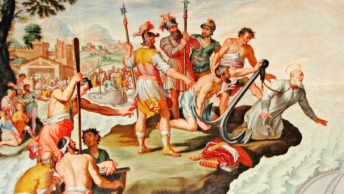
Once upon a time there was a powerful and wealthy king who had a large royal court. One of the king’s many servants was the court jester. One day the jester was entertaining the king by acting in a very silly and foolish way, as was his job, and in appreciation, the king—as a joke—handed a royal scepter to the jester and said, “I declare this to be the Scepter of the Fool. Keep it, jester, until you find a bigger fool than yourself, then give it to him.”
Many years passed, and the king, who had lived a long, prosperous life, was dying. All the courtiers, servants, and attendants were summoned to pay their last respects and say their final goodbyes. In a weakened voice, the king solemnly announced that he was going on a long journey and would not be coming back. The jester respectfully asked, “Your Majesty, throughout your glorious reign, whenever you journeyed to a foreign kingdom, you always sent soldiers and servants ahead of you to prepare the way and to make sure everything was in proper order. May I ask what preparations you have made for this journey you are about to undertake?” With a sad expression, the king answered, “Alas, I have been too busy with the affairs and concerns of the kingdom, and so I have made no preparations for this journey.” “Then,” said the jester, “take this scepter, for at last I have met a bigger fool than myself!” (McArdle, 150 Stories for Preachers and Teachers, #149). It is an act of supreme foolishness to ignore the reality of death and to delay our preparations for judgment. Jesus begs us not to make this mistake—and only if we take our faith seriously will we be ready to meet Him.
God’s timetable is very different from our own; that’s because life on earth is limited by time and space, but God sees everything from the vantage point of eternity. We too will enter eternity when we die—and today’s readings tell us that now is the time to begin preparing for this transition. The Book of Wisdom states that when the Israelites were slaves in Egypt, divine justice seemed to be delayed, but because they obeyed God at the time of the Passover, the Lord intervened in a powerful way to punish their enemies and set them free. The Letter to the Hebrews states that in addition to divine justice, God’s blessings may also seem to be delayed; the patriarchs and prophets did not receive the gift of salvation in their own lifetimes—but because they obeyed God, they were given the assurance that they would one day experience it. As the Reading says, “Faith is the realization of what is hoped for and the evidence of things not seen.” Faith tells us that there is a heaven, and faith challenges us and helps us to be ready for it.
Our Lord’s words in the Gospel make it very clear that we cannot count on automatically and immediately inheriting heaven when we die; as God’s servants, we must be faithful if we are to enter our Master’s kingdom. This means we are not supposed to center our hopes and attention in this world, nor are we supposed to abuse the talents and authority and opportunities we’re given. It has always been the firm and unchanging teaching of the Church that, along with heaven, hell and purgatory also exist, and that experiencing these terrible realities is a real possibility. Indeed, throughout the Gospels Jesus speaks more about hell than He does about heaven. If we die in a state of mortal sin, we have condemned ourselves to hell. If we die in a state of grace, but have not yet finished becoming spiritually perfect, we complete this process in purgatory. In Our Lord’s parable, the disobedient servant who deliberately ignored his master’s wishes was severely beaten and assigned a place with the unfaithful—a metaphorical reference to hell. Another servant who was unfaithful but to a much lesser degree received a lesser beating—a reference to purgatory. As Jesus says, much will be expected of those to whom much is entrusted. As Americans, as Christians, and especially as Catholics, we have been given so much—and so it’s vitally important that we take Our Lord’s words seriously.
If a doctor informed his patient, “I’m sorry to tell you this, but you have cancer,” and the patient responded, “No, everything’s fine because I don’t believe in the existence of cancer,” would that person then be safe from the disease? Of course not—and yet there are persons who foolishly refuse to believe Our Lord’s warnings about what may be awaiting them once their earthly lives are done. People today do not like to think about death, and especially not about purgatory or hell—but truth cannot be changed simply by ignoring it. Death is inevitable; hell is an unnecessary and never-ending tragedy; purgatory is optional and best avoided; heaven is everything we could ever hope for, but not absolutely guaranteed to any one of us. Our Lord once warned that the path which leads to destruction is broad and smooth, and many choose to travel it. Jesus promises eternal life to His followers, but it’s always possible we might lose our salvation through serious or mortal sin or by becoming unfaithful servants who are too attached to this world. It’s our duty to make sure this doesn’t happen, and no one can relieve us of this duty or fulfill it for us.
Being faithful servants in this context means five things. First, whenever we commit a mortal sin, we must sincerely repent and then receive the sacrament of Reconciliation as soon as possible in order to return to a state of grace. Second, we must attend Mass and receive the Eucharist—at least once a week, and preferably more often—so as to confirm ourselves in the state of grace. Third, we must regularly reexamine our priorities, recommit ourselves to doing God’s will, and ask for His guidance and grace. Fourth, we should pray for the conversion of sinners, that they may repent and avoid hell, and pray for those now suffering in purgatory, that they may soon enter heaven, for this concern for other people is very pleasing to God. Fifth, we should offer up all our prayers, actions, experiences, problems, and burdens as a sacrifice for God’s glory, for this will help us grow in grace and lessen or perhaps even eliminate the time we would otherwise have to spend in purgatory. This not a pleasant subject, and I’d apologize for bringing it up and possibly upsetting you— except for one thing: I’m firmly convinced this was message God wanted me to deliver to you. A priest who refuses to preach on purgatory or hell does his parishioners no favor, and a Christian who refuses to think about death and what follows is a bigger fool than any court jester. The Gospel truly is good news—but only if we take it seriously. Jesus begs us to be faithful servants who are ready for their master’s return. Blest will we be if we take His words to heart.








